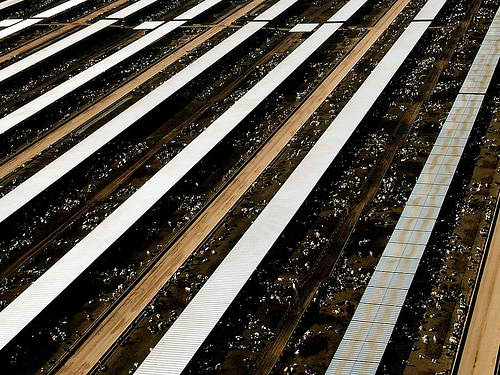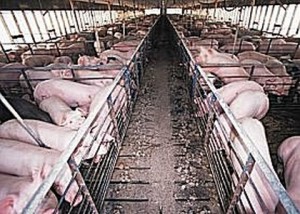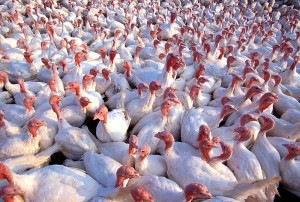 You know things are bad in the US industrial food system when Russia seems to know more about it than American citizens do.
You know things are bad in the US industrial food system when Russia seems to know more about it than American citizens do.
Last week, Russia announced that it intends to ban US imports of beef and pork unless these foods can be certified free of the livestock drug ractopamine.
Racto-WHAT-amine?
Yeah, that’s what I thought when I first learned about Russia’s recent move.
Ractopamine was approved for use in pigs in 1999, cattle in 2003 and turkeys in 2009 – all largely unbeknownst to the public.
Ractopamine is a growth promoting drug which increases muscle mass by actively slowing protein degradation. Unlike other veterinary drugs which are withdrawn prior to slaughter, ractopamine is started and never withdrawn in the animal’s final days. It is given to beef cattle during their last 4-6 weeks, pigs in their last 4 weeks, and turkeys for their last 1-2 weeks.
Given that these animals are actively being given ractopamine immediately prior to slaughter and have been receiving the drug for some weeks preceding, there can be no doubt that a residue of the drug remains in the animal’s meat when it finally hits supermarket shelves.
 Ok, so there’s some ractopamine left in the conventional meat of the 45% of pigs, 30% of feedlot cattle and an unknown number of turkeys.
Ok, so there’s some ractopamine left in the conventional meat of the 45% of pigs, 30% of feedlot cattle and an unknown number of turkeys.
What’s so bad about this drug anyway?
The Bureau of Veterinary Drugs, Health Protection Branch of the Health and Welfare Department of Ottawa Canada found that rats fed ractopamine experienced a cluster of birth defects such as cleft palate, open eyelids, shortened limbs, missing digits, enlarged heart, and protruding tongue.
In 2002, the FDA accused Elanco, a subsidiary of Eli Lilly and manufacturer of Paylean, the brand name for ractopamine for pigs, of a cover-up on the dangers of the drug in animals. There was no mention in Elanco’s documents submitted during Paylean’s approval process of numerous phone calls from farmers reporting that their animals vomited after consuming feed containing Paylean or that they had become hyperactive, overly stressed (“down and shaking”), or had died as a result of exposure to the drug.
Inexplicably, the FDA went on to approve ractopamine for cattle the following year even after it’s 14 page warning letter to Elanco on it’s blatant deception and abuse of the approval process of Paylean for pigs!
 Even though the FDA rolled over on ractopamine, other countries paid attention to the scandal with the growth enhancing drug banned in Europe, Taiwan and China where an estimated 1,700 people were “poisoned” from eating Paylean-fed pigs.
Even though the FDA rolled over on ractopamine, other countries paid attention to the scandal with the growth enhancing drug banned in Europe, Taiwan and China where an estimated 1,700 people were “poisoned” from eating Paylean-fed pigs.
Now, with ractopamine already banned in Europe, Russia is taking the additional step of banning US meat imports unless they can be certified ractopamine-free. While US meat producers are furious at the move, I applaud Russia for taking steps to protect its people from the ravages of exposure to this veterinary drug.
Parents of children beware. There is no doubt that ractopamine residue will eventually be linked to fast growth aka obesity in children and even perhaps hyperactivity as it has been in animals. Don’t wait for that day! Protect your children now!
Opt out of conventional supermarket meats that have a high chance of containing residue of this dangerous drug. Purchase clean, pastured meats for your family and buy locally and in bulk to get prices that are reasonable and fit within your household budget.
Sarah, The Healthy Home Economist
Sources: Who Says It’s Not Safe? US Cattle and Hog Producers Furious Over Russia Meat Ban
“Not Safe for Humans” Drug Being Fed to Livestock







Where can you get meat that’s not from a store?
Yes, America is asleep … just make sure you aren’t! We have to be vigilant if not for ourselves than for our precious children who rely on us to make wise food choices for what we bring into our homes.
Ugh ugh ugh!!!!!!
It’s DES – diethylstibestrol all over again. Big Pharma continues to get away with slow murder……sociopathic %$%$ards
We all have a choice – OPT OUT! Buy local and don’t spend one red cent on conventional meat.
Thank you for keeping us informed! Unfortunately, while it may be true we all have choices, not all of us can opt to buy local grass fed beef.
I live in the desert country of the UAE, hence no grass, and defintely no local grass fed beef.However, we import from everywhere: beef NZ, Australia, Ireland, Canada and Brazil: lamb and mutton from NZ, Australia, Pakistan and India. I buy mostly NZ and Irish beef, and NZ lamb because I am betting they feed their cattle and sheep grass, but who knows?
There is a local slaughter house that I am told, gets its cattle from Holland. I use those bones for stock as there is no other choice. Oh, and we also have local camel–bones too! Camel vegetable soup anyone?
Hey Rebecca
Any NZ beef and lamb you buy from the likes of Spinneys will be grassfed – it all is here in NZ. I just wouldn’t buy NZ pork as they do have some feedlot pigs here, so we only buy our bacon from the likes of Freedom Farms.
I’m not sure if you guys have an organic shop in Abu Dhabi (it’s been 2 years since we left Dubai), but if not, there is one located next to The Greens and also on the lower level of the Dubai Mall (they also have a cafe attached).
I miss the UAE so much and am a little jealous you’re still there, especially with the beautiful winter weather! I need to remind myself that I have access to loads of organics and raw milk here, as well as all my family. But, ahhh Dubai… 🙂
All the best x
The good news is that lots of Moms and Dads buying local to get clean, safe, nutrient dense foods for their children will really bolster the local economies!
America is asleep.
Yes, we just have to buy local from a trusted source don’t we?
Sigh.
You mentioned that the farmers complained about their animals getting sick after eating feed that contained the drug. Do the farmers always know that the drug is in the food? Is it labeled? If not, or if the farmer (even your local one) doesn’t know about the drug and its dangers and is feeding their animals with feed containing it, then does buying local really protect you? It seems like grass-fed (at least for beef) is your best bet.
Yes, buying local does protect you. Farmers do indeed know if they are using these drugs on their animals. These drugs are administered on the feed lot. Local meat is not feedlot produced.
Organic meat, even if not grass fed/pastured, should be fine right?
Supposedly organic meat is ok .. however, I am increasingly suspicious of even organic food IF it has made it’s way through the US industrial food distribution system. There are too many loopholes and things we don’t know about as evidenced by this drug ractopamine that even activist people such as myself had never heard about until this Russia meat ban. I personally feel the ONLY way to ensure safe food is to buy local DIRECTLY from the person who produces the food (or a designee that is running a buying club or whatnot).
The solution is to buy from small family farmers, ideally in your local area, even better who you know. This is more likely to get you the best quality food and it keeps your money circulating in the local economy. Vote with your pocket book.
What is your recommendation to people that live in areas that have no access to local quality meats? I have no resources around here other then beef. So I’m stuck buying the high $ organic meats at the store.